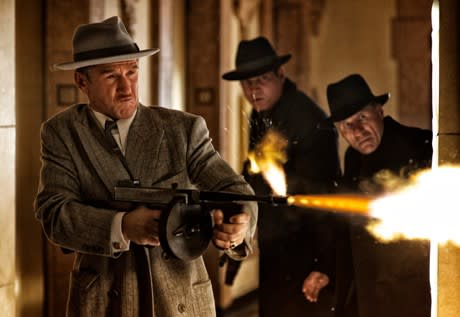Originally, Gangster Squad was slated to open in September of 2012, until a real-life theatre shooting in Colorado made a similar in-film sequence within Grauman's Chinese Theatre appear taboo or unseemly. Only, it's not the proximity to real-life events or the public's collective sense of propriety that make Ruben Fleischer's neon-saturated, artificial parroting of surface mobster genre elements abhorrent. Rather, it's the overall rote sensibilities and callous preoccupation with pornographic violence.
Based loosely on Paul Lieberman's book of the same name, although more closely aligned with The Untouchables, this work of cheap stylization introduces a reductionist, cartoonish vision of post-WWII Los Angeles, filled with crime and corruption, where mobsters like Mickey Cohen (Sean Penn) run the city, cashing in on vice.
Clumsy, wooden LAPD Sergeant John O'Mara (Josh Brolin) narrates, as high-contrast lighting and exaggerated noir colour schemes emulate the glossy aesthetic, building up to his being tasked by clichéd, haggard Chief Parker (Nick Nolte) with building a multicultural dream team of archetypal ciphers (Robert Patrick, Giovanni Ribisi, Anthony Mackie, Michael Peña and Ryan Gosling) to take down the criminal element.
Endlessly going into combat fast and hard, with little logical preparation or success, their efforts — made sexy by "look at me" tracking shots and hyper-realized visuals — are mostly an act of applied redundancy. But no one questions O'Mara's ability to lead in this universe. They shrug it off, make a joke and then flex their muscles in the middle of a gratuitous fight sequence with a Dick Tracy cast-off.
Amidst this is a brief observation about the nature of fighting violence with violence outside of the law, suggesting that the Gangster Squad is at least partially self-consciousness of its sleazy, hypocritical existence, but this grey area, thematic addition is too incongruous and banal to elevate the material.
Unfortunately, rather than analyze or observe the genre it emulates, offering either a deconstruction, or at least a conscious nod to the greater social implications of anarchic ethos, Ruben Fleischer's focus is that of posturing and storyboarded violence.
If anything, this exercise in trash theatrics denigrates the history of cinema and the many actors involved that have little to do with their one-note, filler characters.
(Warner)Based loosely on Paul Lieberman's book of the same name, although more closely aligned with The Untouchables, this work of cheap stylization introduces a reductionist, cartoonish vision of post-WWII Los Angeles, filled with crime and corruption, where mobsters like Mickey Cohen (Sean Penn) run the city, cashing in on vice.
Clumsy, wooden LAPD Sergeant John O'Mara (Josh Brolin) narrates, as high-contrast lighting and exaggerated noir colour schemes emulate the glossy aesthetic, building up to his being tasked by clichéd, haggard Chief Parker (Nick Nolte) with building a multicultural dream team of archetypal ciphers (Robert Patrick, Giovanni Ribisi, Anthony Mackie, Michael Peña and Ryan Gosling) to take down the criminal element.
Endlessly going into combat fast and hard, with little logical preparation or success, their efforts — made sexy by "look at me" tracking shots and hyper-realized visuals — are mostly an act of applied redundancy. But no one questions O'Mara's ability to lead in this universe. They shrug it off, make a joke and then flex their muscles in the middle of a gratuitous fight sequence with a Dick Tracy cast-off.
Amidst this is a brief observation about the nature of fighting violence with violence outside of the law, suggesting that the Gangster Squad is at least partially self-consciousness of its sleazy, hypocritical existence, but this grey area, thematic addition is too incongruous and banal to elevate the material.
Unfortunately, rather than analyze or observe the genre it emulates, offering either a deconstruction, or at least a conscious nod to the greater social implications of anarchic ethos, Ruben Fleischer's focus is that of posturing and storyboarded violence.
If anything, this exercise in trash theatrics denigrates the history of cinema and the many actors involved that have little to do with their one-note, filler characters.
